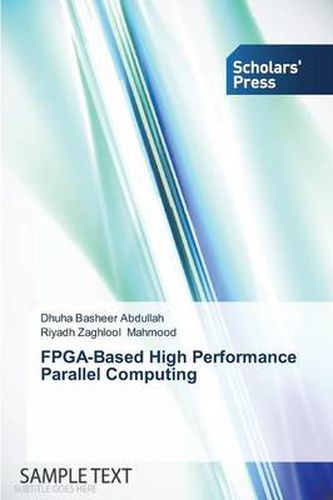Readings Newsletter
Become a Readings Member to make your shopping experience even easier.
Sign in or sign up for free!
You’re not far away from qualifying for FREE standard shipping within Australia
You’ve qualified for FREE standard shipping within Australia
The cart is loading…






This title is printed to order. This book may have been self-published. If so, we cannot guarantee the quality of the content. In the main most books will have gone through the editing process however some may not. We therefore suggest that you be aware of this before ordering this book. If in doubt check either the author or publisher’s details as we are unable to accept any returns unless they are faulty. Please contact us if you have any questions.
High-performance computing refers to the use of advanced computing technologies, especially supercomputers, to solve highly complex, numerically intensive problems in the shortest possible time. Field programmable gate arrays (FPGAs) are emerging in many areas of high performance computing. FPGAs are so flexible and reconfigurable that they are capable of massively parallel operations, explicitly tailored to the problem at hand. There are many of paradigms to put FPGAs at work in a high performance computing environment. There are also many of limitations which restrict FPGAs to reach the performance of application Specific Integrated Circuits (ASICs) but they provide the possibility of changing the hardware design easily while outpacing software implementations on general purpose processors. Since FPGAs offer an inherently parallel computing paradigm The problem of achieving significant speedups on a new architecture without expending exorbitant development effort, while retaining flexibility, portability, and maintainability, is a classic one.
$9.00 standard shipping within Australia
FREE standard shipping within Australia for orders over $100.00
Express & International shipping calculated at checkout
This title is printed to order. This book may have been self-published. If so, we cannot guarantee the quality of the content. In the main most books will have gone through the editing process however some may not. We therefore suggest that you be aware of this before ordering this book. If in doubt check either the author or publisher’s details as we are unable to accept any returns unless they are faulty. Please contact us if you have any questions.
High-performance computing refers to the use of advanced computing technologies, especially supercomputers, to solve highly complex, numerically intensive problems in the shortest possible time. Field programmable gate arrays (FPGAs) are emerging in many areas of high performance computing. FPGAs are so flexible and reconfigurable that they are capable of massively parallel operations, explicitly tailored to the problem at hand. There are many of paradigms to put FPGAs at work in a high performance computing environment. There are also many of limitations which restrict FPGAs to reach the performance of application Specific Integrated Circuits (ASICs) but they provide the possibility of changing the hardware design easily while outpacing software implementations on general purpose processors. Since FPGAs offer an inherently parallel computing paradigm The problem of achieving significant speedups on a new architecture without expending exorbitant development effort, while retaining flexibility, portability, and maintainability, is a classic one.